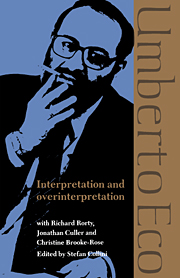5 - In defence of overinterpretation
Published online by Cambridge University Press: 03 February 2010
Summary
Richard Rorty's essay in this volume is less a response to Umberto Eco's lectures than a comment on an earlier paper of Eco's entitled ‘Intentio operis’, which developed a somewhat different argument from that pursued in the lectures. I propose to comment on Umberto Eco's lectures, ‘Interpretation and overinterpretation’, but then will return to some of the points Professor Rorty has raised in his commentary. The pragmatist's conviction that all the old problems and distinctions can be swept away, installing us in a happy monism, where, as Rorty puts it, ‘all anybody ever does with anything is to use it’, has the virtue of simplicity but the difficulty of neglecting the sorts of problems that Umberto Eco and many others have wrestled with, including the question of how a text can challenge the conceptual framework with which one attempts to interpret it. These are problems which, I think, will not disappear with the pragmatist's injunction not to worry, but simply to enjoy interpretation. But I shall return to these issues later.
When I was invited to take part in this event and told that the title of the series of lectures was ‘Interpretation and overinterpretation’, I somehow sensed what my role was supposed to be: to defend overinterpretation. Since I had heard Umberto Eco lecture many times, and well knew the wit and exuberant narrative skill he could bring to the mockery of whatever he chose to call overinterpretation, I could see that defending overinterpretation might well prove uncomfortable, but in fact I am happy to accept my allotted role, to defend overinterpretation on principle.
- Type
- Chapter
- Information
- Interpretation and Overinterpretation , pp. 109 - 124Publisher: Cambridge University PressPrint publication year: 1992
- 6
- Cited by

